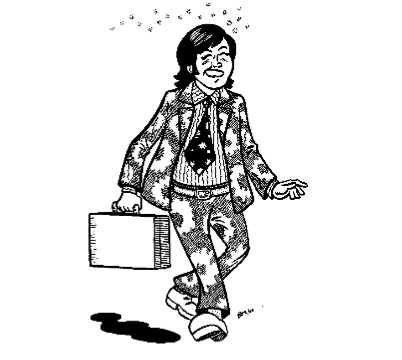In 1989, a man named Chuck Palahniuk enrolled in a Landmark Forum workshop. He was twenty-six years old and, like many of his co-participants, struggling with his life and what to do with it. Despite his lack of vocational direction, Palahniuk had no problem navigating his way to the closest exit after the first forty-five minutes of the workshop, repelled by the program’s cultiness and rigidity. Later that day, however, he returned to complete the training, and that night began writing what would eventually become his best-selling book, Fight Club—a sequence of events which suggests the Landmark Forum was more successful in helping Palahniuk redirect his life than a barrage of inconclusive personality tests, forlorn meetings with career counselors, or years of expensive psychoanalysis.
For many graduates, it is. The Forum’s boot camp approach to self-discovery and self-improvement is arduous yet brief, and its accelerated results have garnered it a growing appeal not only among artists and writers, but also among more corporate types, from CEOs to personal assistants. Depending on your métier, graduation from the Landmark Forum might mean more best-selling novels, greater office efficiency, more one-person gallery shows, increased company productivity, improved profit margins, better movie deals, or heightened creative exchanges with co-workers. (Ross Grayson Bell, producer of the film version of Fight Club and himself a Forum graduate, attributes his and Palahniuk’s creative synchronicity to their shared Forum experience.) While such positive feedback is both convincing and hard to dismiss, few people recall that the Landmark Forum is not simply a career/self-help crash course—its “technologies” (as the Forum refers to them) are derived from Werner Erhard’s controversial est workshop. est, for all its faults, was a major player in the well-meaning Human Potential Movement of the Seventies, a movement which put a premium on human possibility, with an emphasis on the spiritual side of humanity. Since est evolved into the Forum, so has the audience for such “technologies” evolved—from New Age hippies to CEOs to CEO-hippy hybrids—a transformation that provides a lesson not only about corporate identity re-branding and our culture’s shifting standards of legitimacy; it also suggests what we dream about thirty years later, when we dream about our own potential.
*
Est founder Werner Erhard emerged on the Human Potential scene in 1971. Erhard, a former encyclopedia salesman and executive, began a typical sixty-hour workshop with a variation on the following observation: “You’re all complete assholes or you wouldn’t be here.” est participants paid $250 for Erhard’s promise of radical personal change, a reward which came after a participant, in est-speak, “got it.”
By the time Erhard designed and executed his first est trainings in 1971, America had a...
You have reached your article limit
Sign up for a digital subscription and continue reading all new issues, plus our entire archives, for just $1.50/month.
Already a subscriber? Sign in





